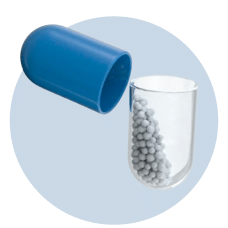Nimef 100mg Tablet
Product introduction
Nimef 100mg Tablet should be taken with food. This will prevent you from getting an upset stomach. In general, you should try to use the smallest amount necessary to control your symptoms, for the shortest possible time. You should take this medicine regularly while you need it. Try not to miss doses as this will make the medicine less effective.
Some common side effects of this medicine include diarrhea, nausea, and vomiting. If any of these side effects do not resolve with time or get worse, you should let your doctor know. Your doctor may be able to suggest ways of preventing or reducing the symptoms.
To make sure it is safe for you, before taking this medicine, let your doctor know if you have any medical conditions or disorders. You should also tell your doctor all the other medicines you're using or taking. Pregnant and breastfeeding women should consult their doctors before using this medicine.
Note: As per the Ministry of Health and Family Welfare, Nimef 100mg Tablet is banned for children under 12 years of age.
Uses of Nimef Tablet
Benefits of Nimef Tablet
In Treatment of Fever
In Pain relief
Take it as it is prescribed to get the most benefit. Do not take more or longer than needed as that can be dangerous. In general, you should take the lowest dose that works, for the shortest possible time.
Side effects of Nimef Tablet
Common side effects of Nimef
- Nausea
- Diarrhea
- Vomiting
- Increased liver enzymes
How to use Nimef Tablet
How Nimef Tablet works
Safety advice
Use of Nimef 100mg Tablet is not recommended in patients with severe kidney disease.
What if you forget to take Nimef Tablet?
All substitutes
Quick tips
- Nimef 100mg Tablet is used to relieve pain, inflammation, and fever.
- Take it with food or milk to prevent upset stomach.
- Take it as per the dose and duration prescribed by your doctor. Long term use may lead to serious complications such as stomach bleeding and kidney problems.
- Inform your doctor if you have a history of heart disease or stroke.
- Avoid consuming alcohol while taking Nimef 100mg Tablet as it can increase your risk of stomach problems.
- Your doctor may regularly monitor your kidney function, liver function and levels of blood components if you are taking this medicine for long-term treatment.
Fact Box
Interaction with drugs
Patient concerns
FAQs
Is Nimef 100mg Tablet an antibiotic?
Can I take Nimef 100mg Tablet with paracetamol?
Does Nimef 100mg Tablet contain aspirin?
Is Nimef 100mg Tablet safe?
Can I take Nimef 100mg Tablet for headache?
Does Nimef 100mg Tablet make you drowsy (feeling sleepy)?
Does Nimef 100mg Tablet contain sulphur?
What does Nimef 100mg Tablet treat or used for?
Can I take Nimef 100mg Tablet with ibuprofen?
Can I take Nimef 100mg Tablet with aspirin?
Is Nimef 100mg Tablet safe?
Is Nimef 100mg Tablet banned?
Is Nimef 100mg Tablet safe during breastfeeding?
Is Nimef 100mg Tablet safe in pregnancy?
Is Nimef 100mg Tablet safe in asthma?
Is Nimef 100mg Tablet an antibiotic?
Can I take Nimef 100mg Tablet with paracetamol?
Does Nimef 100mg Tablet contain aspirin?
Is Nimef 100mg Tablet safe?
Can I take Nimef 100mg Tablet for headache?
Does Nimef 100mg Tablet make you drowsy (feeling sleepy)?
Does Nimef 100mg Tablet contain sulphur?
What does Nimef 100mg Tablet treat or used for?
Can I take Nimef 100mg Tablet with ibuprofen?
Can I take Nimef 100mg Tablet with aspirin?
Is Nimef 100mg Tablet banned?
Is Nimef 100mg Tablet safe during breastfeeding?
Is Nimef 100mg Tablet safe in pregnancy?
Is Nimef 100mg Tablet safe in asthma?
Disclaimer:
Tata 1mg's sole intention is to ensure that its consumers get information that is expert-reviewed, accurate and trustworthy. However, the information contained herein should NOT be used as a substitute for the advice of a qualified physician. The information provided here is for informational purposes only. This may not cover everything about particular health conditions, lab tests, medicines, all possible side effects, drug interactions, warnings, alerts, etc. Please consult your doctor and discuss all your queries related to any disease or medicine. We intend to support, not replace, the doctor-patient relationship.References
- Grosser T, Smyth E, FitzGerald GA. Anti-Inflammatory, Antipyretic, and Analgesic Agents; Pharmacotherapy of Gout. In: Brunton LL, Chabner BA, Knollmann BC, editors. Goodman & Gilman’s: The Pharmacological Basis of Therapeutics. 12th ed. New York, New York: McGraw-Hill Medical; 2011. pp. 509p. 992.
Marketer details
The list of available options shown with the same composition has been prepared upon the advice of registered medical practitioners, pharmacists affiliated with TATA 1MG. TATA 1MG does not promote any pharmaceutical product of any particular company, and all recommendations are based on the medical opinion, advisories from specialist medical and pharmaceutical professionals.
Lab tests offered by us










